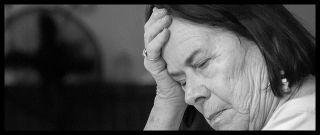Grief
Navigating Grief and Loss as an Autistic Adult
How does grief manifest differently for adults on the spectrum?
Posted December 24, 2014

It’s the holiday season...a time for reflection, togetherness, and joy, so they say. As I’ve written before, it hasn’t always been that way for me. This holiday season has been an especially difficult one. One of my best friends passed away over Thanksgiving weekend.
The experience has been a difficult one for me in many ways. Not only because I have the same feelings anyone else would at losing someone who was such a large part of their life, but because, for me, there are few blueprints out there that fit my grieving process and the additional challenges that being on spectrum brings to it.
Sadly, how autism is often framed seems to result in an absence of interest in the emotional lives of adults on the spectrum. Back when I wrote about autism and suicide, I found next to nothing on the topic -- yet it has been shown since it is a very real problem. In the weeks since my friend passed, I’ve searched for information on autism and grief and it has shown very similar results.
Fortunately for me, at least a few adults on the spectrum have chosen to tackle the topic themselves — which has been invaluable for me as I navigate my own grief. Most useful to me has been a post I read some years ago by Karla Fisher of Karla’s ASD page. In it, she wrote about the ways in which her own grieving process differed from what is most frequently observed in neurotypicals, and the unique challenges those differences posed. Not all of it applied to me directly, or in exactly the same way, but much of it was very similar.
Like Karla, I have also had less experiences with death than many my age. My family members’ life spans seem to exist on two poles, with extreme longevity on one hand, and early death on the other. I have had several relatives who have survived well into their nineties, even close to one hundred. Meanwhile, one grandparent died at thirty-five, long before I was born. The deaths I have experienced have mostly been at an arm’s length, due to family tensions, geographical separation, or a combination thereof. Until recently, I’d only ever been to one viewing — a member of my stepmother’s family whom I barely knew.
As a result, I have no blueprint for the what to expect in the social situations that have come with an event like this. I have been forced to guess my way through, at a time when my typical abilities are compromised by the emotional overload brought about by loss and grief. How well have I done? I honestly do not know. I don’t know what standard I’m being held to, and by whom. I have had to simply do my best, but I have been haunted by my struggle to know exactly what I need to do to be a good friend to someone who is no longer here to tell me what she expects.
I comfort myself by telling myself that being one of a very few people who know the full extent of my struggles, she would understand. That she’d fully appreciate the effort it has taken for me to do the things I have been able to do. Yet, there’s a part of me that still can’t set aside the fear of judgements of those left behind. I’ve heard too many people talk negatively about how others grieve...people who, presumably, are more socially gifted than I am.
It has been posts like Karla’s that have helped to keep me grounded to the reality that whatever others’ judgements of my responses, they are normal for me, and others like me. This has made it easier for me to accept my own responses, and helped me to equip myself emotionally for challenges that I may not have fully foreseen otherwise.

One example is how Karla describes her initial reaction to the stroke that caused her father’s death. She says, “I cried a tiny bit in the weeks that he stayed in the hospital in a dark coma, but mostly I was uncomfortable with all the weeping and emotions from my other family members during this time. I was pretty rational and emotionally regulated compared to them and also highly interested in the science, research, and medical facts. It was logical to me to be as armed as possible with knowledge in order to be of some help.”
This resonates, with some slight differences. I am, usually, a very emotional person. When I feel sad, weeping can be uncontrollable. When I am angry, it can be hard to contain the rage. Yet, in some of the worst times of my life, it’s like a switch goes off and I’m able to be much calmer than others. This goes back even to my childhood and teen years. In medical crises, especially, this seemed to be true. The problem with this, I’ve learned over the years, is that this calmness is deceptive...it’s a mark of emotional overload, which will come out one way or another. Sometimes with a great delay.
The morning I learned of my friend’s death, I cried a great deal. I was deeply in shock, and that shock was made all the worse by the fact that I had been with her only hours before, and I now had to relive and describe those last moments with her to first responders, knowing that her body was only feet away. I could not bear see it. When I began making calls to mutual friends, I broke and wept on the phone with them. I didn’t try to script the call, I couldn’t, or I’d be too frightened to do it. And I knew that I owed more than that to my friend, and to those I was calling. I could only respond in the most genuine way I knew how.
But, for all that emotion in those early hours, it seemed to blow over like a storm. Suddenly, I wasn’t feeling much at all. Yet, the marks of pain were still there. The first night, I didn’t sleep. I found myself staring into space, replaying what I knew of my friends’ last hours over and over...attempting to make sense of what happened. The following day I just kept busy. By the time I returned to our mutual workplace, and shared friends, the calm had mostly taken over. I had mixed feelings about this...I worried that it made me look cold and that would upset others, but I was also comforted by it. My worst nightmare would be to breakdown emotionally in the workplace. I knew it would not manifest itself in a way that most of my neurotypical coworkers would be able to understand.
In Karla’s post, she goes on to describe how her emotional stress, which she had “no way to process or deal with,” went on to appear unexpected ways. She wrote, “In my case, I did not have outward meltdowns in the traditional sense, but instead I had shutdowns whereby I lost actual abilities. What this looked like to the rest of the world is that my autistic symptoms worsened... and they did.” These shutdowns affected things like focus and sensory processing. This happened with me as well.
My first sign of trouble were what autistic adult Ennien Ashbrook referred to in my book “strange engine signals” — feelings, physical sensations, stims, tics, or behaviors that serve as indicators that I have emotions brewing of which I’m not fully aware. In the first few days, for example, when I was approached by friends and coworkers offering their condolences, I felt outwardly calm. Yet, when I talked about what happened, I felt a trembling deep in my gut and others told me my skin appeared very pale. Over the next few days, I developed challenges with executive functioning. I lost my focus, forgot things, and had trouble getting organized. I re-developed checking compulsions I thought I’d long since conquered.
Then the emotion began to leak out. One day I was sitting in a meeting when I felt my cheeks get hot. This is a telltale sign that I’m angry, but I wasn’t aware of the anger right away, and when I was, the trigger didn’t make sense. It was something that would normally be an annoyance, but I was reacting to it as if it was something much more egregious. Eventually I made the connection. The previous day, I’d had two separate interactions with individuals that had made me angry. At the time, I’d congratulated myself that I was able to respond rationally and calmly to conversations that in other situations would be maddening. Turns out it was maddening after all, however it had taken my brain a full 24 hours to realize that....and a separate trigger to bring it into my conscious awareness.
Although it’s deeply painful that this should have happened during the holiday season, in a way I have been lucky as to the timing as it has enabled me to take some time off, time I need to get my emotions and neurology back on an even keel. Sometimes, it makes me sad that I lack family nearby, but this season, it’s a bit of a blessing. The social demands of a typical holiday are simply beyond me right now. Some things I process best alone, or with only a few trusted companions who understand what I’m dealing with.
I know this is just the beginning of the process, but I have learned a lot about myself along the way. I’ve found a resilience I didn’t know I had (which I hope continues). Most of all, I’ve learned I’m not alone. And that is a comfort, in and of itself.

In her post, Karla talks about how the differences in how she responded to grief led to a number of misunderstandings between herself and her therapist. She calls, at several points, for therapists to learn more about these differences...and I agree. This knowledge is crucial for anyone looking to support a person on the spectrum through a major loss.
Likewise, as my experience has shown, this type of information is incredibly important for individuals on the spectrum to know for their own sake. I know in my case, it’s made all the difference in the world. I hope that more of us will do as Karla did, and share their stories. You never know when it might help someone else. It certainly did me.
For updates you can follow me on Facebook or Twitter. Feedback? E-mail me.
My book, Living Independently on the Autism Spectrum, is currently available at most major retailers, including Books-A-Million, Chapters/Indigo (Canada), Barnes and Noble, and Amazon.
RELATED READING
Karla Fisher – Autistic Grief is not like Neurotypical Grief
"I discovered ASD via grief.
It was on my 47th birthday that I actually had the misfortune to witness the death of my father via stroke. Had I entered the room just five minutes later, I would have missed hearing his last words or seeing the terror in his eyes as he fell victim to stroke. I stood helplessly by, watching him go dark and watching him being airlifted to Hershey Medical Center in Pennsylvania."
Pensive Aspie — When Logic Fails: Asperger's and Grief
"How does a person with Asperger’s process death? Do we experience grief the same way that neuro-typical people do? These were my questions as I struggled to understand my personal grief when my niece died last October...After her death, I felt like my grief was somehow different than the rest of my family. Like a typical Aspie, I tried to research it. I googled Asperger’s and grief. I found almost nothing pertaining to ADULT grief."
Eccentrics United — Asperger's and Death
"Death is not easy for anyone to accept. When a friend or family member dies, most people handle this devistation by crying or grieving in some other way and go to friends and family for support. Do people with Asperger's syndrome grieve differently?"




